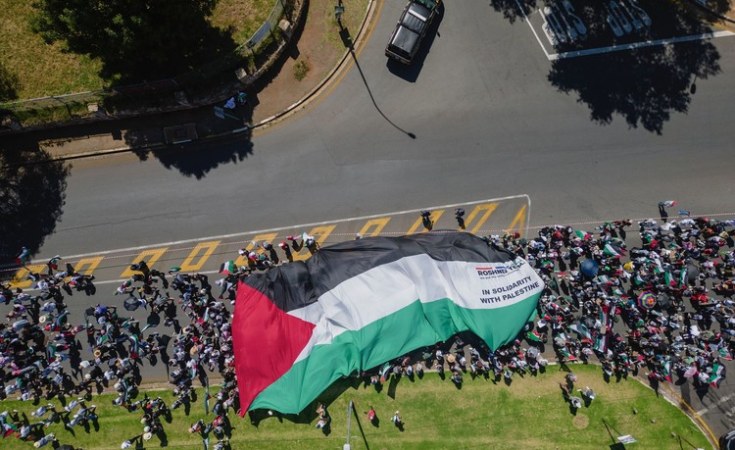African countries are assuming an increasingly individualistic approach to foreign policy that are sometimes at odds with those of international powers.
The war in Gaza is dividing African countries far more than their differences over Russia's war of aggression in Ukraine.
"Contrary to the Russia-Ukraine conflict, we saw an effort from the African leadership to respond as a bloc," Fredson Guilengue, a Johannesburg-based analyst with the Rosa Luxemburg Foundation, which is affiliated with Germany's socialist Left party, told DW.
Support by African countries for the UN General Assembly's March 2 resolution demanding Russia's withdrawal from Ukraine was relatively weak. Just 28 of Africa's 54 member states voted in favor, while 17 abstained and eight didn't vote. Eritrea, a dictatorship, voted against the resolution.
Yet many African countries have emphatically and consistently called for a cease-fire between Israel and Hamas, said Alex Vines, head of the Africa program at the Chatham House policy institute in London. "There have been very few countries in the African continent that have taken a pro Israeli stance," he said.
The African Union was quick to side with the Palestinians, with AU Commission Chairman Moussa Faki Mahamat appealing to both sides to cease hostilities. "The Chairperson wishes to recall that denial of the fundamental rights of the Palestinian people, particularly that of an independent and sovereign State, is the main cause of the permanent Israeli-Palestinian tension," he said in a statement on October 7, the same day that Hamas, which is classified as a terror group by the US, EU and other governments, attacked communities within Israel. Later it became clear that Hamas had killed nearly 1,200 people and taken about 240 hostages.
Support for Israel
Some African countries have expressed support for Israel, Guilengue said. Kenya, Ghana, Zambia and the Democratic Republic of Congo have shown solidarity with Israel and explicitly condemned Hamas. In Kenya, for example, President William Ruto spoke out strongly against terrorism and attacks on innocent civilians, despite criticism from opposition politicians, who called for relations with Israel to be severed.
Other countries, South Africa in particular, have taken a pro-Palestinian position, Guilengue said. The country did not openly condemn Hamas and blames Israel for the escalation of the conflict. In November, South African parliamentarians voted to break off diplomatic relations, though the decision is not binding for the government, which itself has called on the International Criminal Court in The Hague to investigate whether Israel had committed war crimes in the Gaza Strip, repeatedly comparing the country's military response to the Hamas attacks to genocide.
Guilengue said these reactions had to do with South Africa's history of apartheid, which many there compare to conditions and events in Gaza. Foreign Minister Naledi Pandor has repeatedly stated that South Africa will not be drawn into taking sides, but has criticized the West for selectively condemning Russia while ignoring other acts of aggression such as the Israeli occupation of the Palestinian territories.
Protecting Africa's interests
People across Africa have long shown solidarity with Palestinians, said Gilles Yabi, the head of Wathi, a think tank in Senegal that is focused on West Africa. A sense of a shared history of colonialism plays a major role in that stance. Many governments across Africa support establishing a Palestinian state that could exist alongside Israel, Yabi said recently in his podcast for the International Crisis Group.
The countries that have allied themselves with Israel are motivated by other factors, such as military and economic support from the country and its allies, Guilengue said.
"They actually don't want to show a position that will go against the interest of Israel," he said, "because it might also mean going against the interest of the United States and the West."
Though Russia does not have a presence in Africa on par with that of the most powerful European countries and the United States, it is still valued as a partner by many countries.
Stance on Ukraine
Some African governments consider Russia's war against Ukraine to be a matter of European security interests. Over the course of 2023, African countries have increasingly decided that they don't want to be pigeonholed in their response to global crises: "They don't want to be pro-Western, pro-Chinese or pro-Russian," Chatham House expert Vines said.
As such, the number of votes for Russia in the UN General Assembly has fallen significantly. "Many African countries are increasingly voting a la carte on these issues," Vines said.
African countries have stood strong against diplomatic pressure over the Russia-Ukraine conflict, Guilengue said. Despite visits by high-ranking representatives of Russia and Western nations, governments across Africa have insisted on a largely impartial position, relying on peace mediators. The AU, including South Africa, sent delegations to Russia and Ukraine after the outbreak of the war to propose ways to settle the conflict.
This is in keeping with African governments' attempting to take a more active role in global diplomacy, while at the same time consolidating the economic importance of players such as China, which offer alternatives for aid and investment.
This article was originally written in German.


